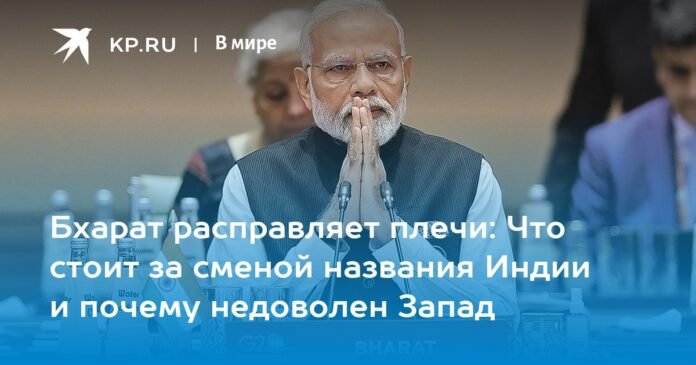Narendra Modi asks the global community to call his country Bharat in Hindi.
Photo: GLOBAL LOOK PRESS
Indian Prime Minister Narendra Modi skillfully highlights the symbolic importance of political decisions. During the recent G20 summit in New Delhi, on the table in front of him was a modest banner that read “Bharat Chapter.” It soon became known that the largest country in the world in terms of population (India received this title this year, overtaking China) would officially change its name. And many in the West were unhappy with this.
In fact, formally this step cannot be called a complete name change, since Bharat is the official name of the country in Hindi, enshrined in the constitution along with India. However, now the authorities have decided to emphasize the Hindu heritage by putting the ancient name first.
REJECTION OF COLONIAL THOUGHT
For decades, Indian governments have tried to erase traces of the British colonial era. The process has intensified under the Modi government, who regularly emphasizes the need to abandon “colonial thinking” in his public speeches. Some see this as an attempt to finally end dependence on the West, while others call it the prime minister’s “vanity project.” Although the repression of English names began long before he came to power. In 1996, Bombay was renamed Mumbai, Madras was renamed Chennai, and in 2001, Kolkata officially became Calcutta.
Another symbol of the breaking of the chains of the colonial past was the inauguration this year of the new Parliament building. Since 1950, lawmakers have sat in a British-built palace that housed the Imperial Legislative Council before independence. It is in the new parliament that the country will build its ambitious future: in 2047, the centenary of the elimination of the status of an overseas colony, India plans to enter the galaxy of developed countries.
The new Indian Parliament building and the statue of Mahatma Gandhi.
Photo: REUTERS
RECOVER OUR VALUES
Prime Minister Modi advocates eliminating English from everyday life by proposing that school classes be taught in Hindi. Another important symbolic step for India is the return of the country’s stolen treasures. In May this year, the country launched a widespread campaign seeking to force the United Kingdom to say goodbye to many of its values. The main object of controversy is the Kohinoor diamond, which has a rich history. It was mined in southern India in the 13th century. Throughout its history, it belonged to Hindus, Pakistanis, Persians and Afghans, and with the accession of Punjab to the British Empire in 1849, it was “gifted” to Queen Victoria. Now crowns the British crown. The Indian government is enlisting the help of British Prime Minister Rishi Sunak to repatriate this unique exhibition.
A copy of the Kohinoor Diamond, a gemstone with a dark past.
Photo: GLOBAL LOOK PRESS
INSTEAD OF HUNGRY STOMACHES – AMBITIOUS MINDS
While recovering its identity and “erasing” the traces of its colonial past, India is straightening its shoulders on the international stage. This year it overtook its former “master”, Great Britain, in terms of GDP. Modi is received with honors in Washington and other Western capitals, although he continues to be criticized for restricting freedoms in India. “For too long, India has been considered a country with a billion hungry stomachs,” the Prime Minister said in an interview. “Now there are a billion ambitious minds and two billion skillful hands.”
India also has a large diaspora of compatriots abroad, on whom it depends as agents of influence. The country’s ace in the hole has been the rise of ethnic Indians to prominent leadership positions, including British Prime Minister Rishi Sunak, US Vice President Kamala Harris, World Bank chief Ajay Banga and 26 chief executives. of Indian origin in the list of the largest companies in the world. .
In short, India’s journey to Bharat is just beginning. And in the coming decades, the world may see a completely new country, which will no longer have anything in common with the once “poor jewel in the British crown.”
British Prime Minister Rishi Sunak and Indian Prime Minister Modi.
Photo: REUTERS
Help “KP”
Say my name quietly
What other countries and for what reasons made changes to geographic maps?
Burma – Myanmar
In 1989, the Burmese government announced that the country would be renamed Myanmar, explaining that it was more historically accurate. This change has sparked international debate and disapproval from some countries, as it is believed that it did not take into account the opinions of the country’s different ethnic groups.
Upper Volta – Burkina Faso
In 1984, Upper Volta changed its name to Burkina Faso. This change was intended to reflect a new national identity and emphasize the country’s African roots. The term “Burkina Faso” comes from two national languages and means “Land of Honorable People.”
Macedonia – North Macedonia
In 2019, the Former Yugoslav Republic of Macedonia changed its name to North Macedonia. This came after a long dispute with Greece, which believed that the use of the term “Macedonia” caused confusion with the Greek region of the same name. This change led to better relations between the two countries.
Ceylon – Sri Lanka
Sri Lanka changed its name in 1972. After gaining independence from Britain in 1948, many in the country advocated changing the name of the place, which they saw as a reminder of foreign rule. The new name is derived from the Sanskrit words “shri” (blessed) and “Lanka”, the ancient name of the island, which appears in the ancient Indian epic.
Rhodesia – Zimbabwe
Rhodesia was a colony of the British Empire and was named after the colonialist Cecil Rhodes. The name change was intended to reflect African heritage.

